Are spiritual gifts available today or did they cease after the original apostles died? In this interview, I talk to Dr. Sam Storms about his own personal experience with speaking in tongues, his biblical case for why gifts are available today, and how he makes room for them in his church services. Before delving in, I want to just clarify some quick vocabulary. You are going to hear two terms a lot, and I want to be sure you know what they mean. The first is cessationist. This is someone who believes spiritual gifts ceased with the death of the apostles. The other term is continuationist, which is someone who believes these manifestations continue right down to our own day.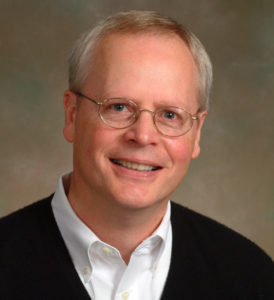
Dr. Sam Storms has a Ph. D. from the University of Texas and has pastored for about forty-five years in Texas, Missouri, and Oklahoma. He taught at Wheaton College for four years and now serves as the lead pastor of Bridgeway Church in Oklahoma City, Oklahoma. He’s the founder of Enjoying God Ministries and serves on the boards of Desiring God Ministries, Bethlehem College and Seminary, and Acts 29 Network. He’s the author of numerous published books and articles (see below). He describes himself as “an Amillennial, Calvinistic, charismatic, credo-baptistic, complementarian, Christian Hedonist who loves his wife of 47 years, his two daughters, his four grandchildren, books, baseball, movies, and all things Oklahoma University.”
—— Books ——
- Language of Heaven: Crucial Questions about Speaking in Tongues by Sam Storms
- Understanding Spiritual Gifts: A Comprehensive Guide by Sam Storms (not yet released)
- Practicing the Power: Welcoming the Gifts of the Holy Spirit in Your Life by Sam Storms
- Simply Spirit Filled by Andrew Gabriel
—— Links ——
- Find out more about Enjoying God Ministries and Sam Storms at samstorms.org
- Check out the Bridgeway Church website
- Listen to David Bercot’s lecture, “What the Early Christians Believed about the Gifts of the Spirit“
- See more Restitutio resources on the holy spirit
- Intro music: Good Vibes by MBB Attribution-ShareAlike 3.0 Unported (CC BY-SA 3.0) Free Download / Stream: Music promoted by Audio Library


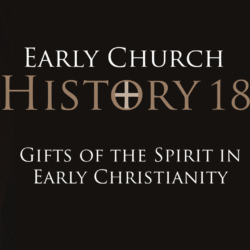

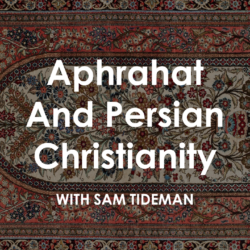
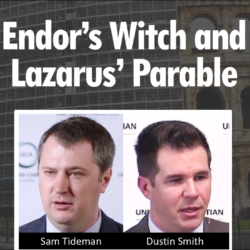
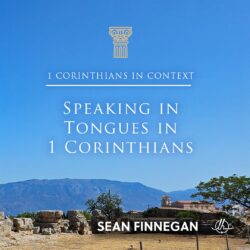
Sean, I agree with your creed: “Truth has nothing to fear.” So I hope these comments see the light of public day.
First, I’m not a Cessationist.
But if any type of label is necessary I would prefer Evidentialist. That is, I follow the NT pattern of true “signs and wonders” performed by those of “the sound doctrine of our lord Jesus Christ,” i.e., as per the non-trinitarian creed of Jesus (Mark 12:28-32) and the Gospel as the Kingdom of God (Acts 8:12).
Towards the end of this podcast you claim that what we find throughout church history is in fact “a continuation of spiritual manifestations that we see in the NT.”
“Sometimes,” you say, “people make the claim that the Pentecostal movement, at the dawn of the 20th century, started this interest in speaking in tongues, prophecy, healing. That’s simply not the case. That’s just a historically false statement. I would even just refer you to Wikipedia to disapprove that. You’ll find lots of historical precursors to the Pentecostal movement.”
It sounds to me like you’re giving NT legitimacy to the so-called Azusa Street Revival of more than 100 years ago and to the various so-called “Blessings” it has spawned since.
Not so long ago I actually did a teaching on so-called “tongues” and used this same Wikipedia article you seem to reference: https://en.wikipedia.org/wiki/Glossolalia#History
The History section has a list of early Catholic “saints” like Thomas Aquinas and Protestants who claimed to “manifest” charismatic gifts.
So giving legitimacy to trinitarian charismatics is quite baffling coming from a non-trinitarian ministry.
Lastly about your guest.
I was introduced to Dr. Storms years ago while doing research on the so-called “Servetus Affair.” I compiled a video at the time where Dr. Storms makes factually incorrect claims about early non-trinitarians, attacking them as “extremists” who advocated “social unrest.”
In the video below Dr. Storms justifies the murderous actions of Calvin by saying that the non-trinitarian “heresy” of Servetus at the time “was a public crime…disruptive to the fabric of society, viewed on the same level as robbery or murder.”
Then Dr. Storms joins the others on this panel (including the noted Calvinist John Piper) by mocking and laughing (with the audience!) about the whole sick and sad episode that led to the burning alive of an innocent human being.
As far as I know Dr. Storms remains an unrepentant Calvinist at heart!
https://youtu.be/86r48x_fiF0
Carlos,
If you are not a cessationist, then it seems you claiming to be a continuationist (at least of some sort). In my view, the question about spiritual gifts (e.g., tongues, prophecy, etc) is a binary one: either there are genuine spiritual gifts and God inspires people who have his spirit to demonstrate the power and presence of that spirit either for their own benefit or the benefit of the church, or God does not inspire his people to manifest spirit and there are no genuine proofs of the spirit (listed in 1 Cor 12:8-10) being demonstrated today.
I would like to know if you have ever witnessed a genuine gift of the spirit in your Christian experience? Particularly, have you ever heard genuine speaking in tongues or interpretation or prophecy? I am curious to understand what an “evidentialist” would categorize as the genuine inspiration of God where God’s spirit is evidenced through manifesting that spirit for others to see and hear like with tongues, interpretation, and prophecy.
I think the danger of the skeptical approach that it appears you seem to be taking is that it inadvertently (or intentionally on account of fear) dismisses a primary way that God is at work through his spirit in believers all around the world. As restorationists, shouldn’t we endeavor to heed the admonitions of Paul to seek the gifts of the spirit and have them be functioning in the church for our edification (esp interpretation and prophecy; cf. 1 Cor 14:1-5)?
With respect,
Jerry
Jerry,
An Evidentialist is someone who says “show me and tell me what you believe!” So it’s not someone who simply says “show me and I’ll believe you.”
So whether or not the gifts have ceased gets clouded to the point of confusion if we don’t “test the spirits to see if they are from God.”
The real danger of delusion is when we do not apply these simple biblical standards.
So I’m curious as well….
Have you asked yourself why would one and the same non-trinitarian spirit validate churches regardless of their biblical beliefs and practices?
And if so, are we not then mandated to join Catholics, Protestants or whatever church denomination is manifesting said gifts?
As you well know there are “many members in one body and all the members do not have the same function….Since we have gifts that differ according to the grace given to us, each of us is to exercise them accordingly.” Rom 12:4-6
The Christian responsibility is, after all, for “each one, as a good manager of God’s different gifts, to use for the good of others the special gift he has received from God.” 1Pet 4.10
As you might know, I grew up agnostic and landed in a small home church. The people were mostly family, friends and former Assemblies of God. So they were very much into the so-called “tongues speaking,” “holy spirit baptism,” etc.
The reason I started to question what I was experiencing was due to my reading of how Paul defined the practice of gifts like prophecy and glossolalia.
When I came to my then pastor with questions based on what I was reading in scripture, to my surprise he agreed with me.
For example, he admitted that glossolalia was an unlearned, foreign language; that they had to be interpreted; that predictive prophecy was not just about “God loves you and wants the best for you,” etc.
Hope this helps,
Carlos
Hi Carlos,
Thanks for your response. But my main question that I posed above is whether or not you have experienced yourself or with other believers genuine gifts of the spirit, particularly speaking in tongues, interpretation, and prophecy. While you appear to admit their legitimacy for believers today as you seem to hold to some degree of continuationism, you describe such a skeptical approach as to lead me to think you have never witnessed God’s spirit evidenced in this way in your life. I am asking if this is true? If it is not, can you please then explain when you have seen/heard tongues, interpretation, or prophecy so that I can understand what an “evidentialist” would classify as genuine evidence of the gifts of the spirit.
Thank you,
Jerry
Hi Jerry,
Not according to the Evidentialist, biblical standards I explained above.
So have you verified the accuracy of prophecy as 100% accurate predictions?
Have you authenticated “tongues” as the miraculous speaking of an unlearned foreign language?
And most importantly, do said claimants profess the non-trinitarian Gospel about the future KOG?
PS: as you well know, glossolalia “are a sign not for believers but for unbelievers” (1Cor 14:22a).
Hi Jerry ;
Do you think your own personal ‘glossolalia’ is a real human language ?
God bless you,
John.
How do you understand Jesus words at Matthew 7: 21 “Not everyone who says to me, ‘Lord, Lord,’ will enter the kingdom of heaven, but only the one who does the will of my Father who is in heaven.
Doing the will of the father is what qualifies one to enter the kingdom.
Many will say to me on that day, ‘Lord, Lord, did we not prophesy in your name and in your name drive out demons and in your name perform many miracles?’
I would argue the “on that day“ refers to Matthew 25:31-46 where Jesus clearly lists what will qualify one to enter into the kingdom. Non of the gifts are mentioned in fact Jesus words above seem to me to be a short hand list of the gifts mentioned by Paul at 1 Corinthians, Jesus goes on to say “Then I will tell them plainly, ‘I never knew you. Away from me, you evildoers!’
Just prior to this Jesus says “Thus, by their fruit you will recognize Them” could it be that the true manifestation of the Spirit is recorded for us at Galatians 5:22
”But the fruit of the Spirit is love, joy, peace, forbearance, kindness, goodness, faithfulness, gentleness and self-control. Against such things there is no law.”
In other words I am suggesting that Jesus himself places the list of good deeds such as giving water, clothes, food ect above the supernatural manifestations of the Spirit. This would be in line with the prophetic tradition of the Hebrew Scriptures such as recorded at Ezekiel 18:5-9 and Isaiah 58:6,7 “Is not this the kind of fasting I have chosen: to loose the chains of injustice and untie the cords of the yoke, to set the oppressed free and break every yoke? Is it not to share your food with the hungry and to provide the poor wanderer with shelter– when you see the naked, to clothe them, and not to turn away from your own flesh and blood? According to the prophet Ezekiel it is on the basis of these acts of goodness that one will positively keep living. Jesus seems to echo this sentiment in line with the prophetic tradition in my opinion. Regards David
I have witnessed miraculous healings following prayer.
Thank you, Sean and Sam,
for a thoughtful presentation. I heartily recommend, by the way, two of Sam Storm’s insightful books: To Love Mercy and One Thing.
I respond here as a believer who was totally on board with Sam’s current perspective for more than four decades before thoroughly reconsidering my previous assumptions. I never was put off in years past by what I considered to be excessive displays – of which I was always well-ware since 1972, when I began speaking in tongues. My later changed perspective did come from some biblical and historical studies, as well as some careful evaluation of fruit among us who were not prone to over-the-top theatrical displays.
It is unfortunate that modern Christians feel compelled to divide into absolute either / or “cessationist” vs. “continuationist” camps. For example, a genuine, biblical student or scholar could very well be a limited “cessationist”, at some level, who practices faithful prayers for healing, with no doubts as to God’s ability to answer prayers and perform powerful miracles!
So as not to make my points too tedious in one place, I will post more details later in another “comment” or two.
Ken LaPrade
For years I enthusiastically read and enjoyed dozens of books which agreed with my exuberant Tongues WilPentecostal / Charismatic assumptions. Here are a mere handful which offer some gentle, kind-hearted rebuttal to my previous way of thinking:
Spiritual Gifts by Thomas R. Schreiner
Tongues Shall Cease? by Tony Watts
Fields White Unto Harvest (Charles F. Parham and the Missionary Origins of Pentecostalism) by James R. Goff, Jr.
Tongues Will Cease … But When? by Raymond Faircloth
By the way, in studying certain biblical matters about spiritual gifts, I also, (like Sam Storms) do not subscribe personally to the hypothetical use of 1st Cor. 13 to put a time limit on gifts – to indicate the second century, the death of the apostles, or the compilation of N.T. Scriptures.
Nevertheless, I believe a good Bible student could and should carefully compare spiritual gifts, etc., in their first century biblical context with the 1901 movement which originated in Topeka, Kansas – under the teaching of Charles Fox Parham. It is not a myth that this Pentecostal movement was not a direct “continuation” of nineteenth century zealous aspects of the holiness movement, nor was it a “continuation” of previous sporadic outbreaks of “tongues”. See the book: Fields White Unto Harvest.
To compare Parham’s 1901 theology of the “baptism of the Holy Ghost” (with tongues as initial evidence given to all) to 1st Cor. 12: 27-30 (in which tongues is NOT given to all) is a valid subject of careful study. Parham’s movement led directly to the Azusa Street Revival and quickly to all modern developments of Pentecostalism and modern Charismatic activity. (I will post this as is – since my reply block is frozen – I’ll correct and conclude in a later post.)
Along with that, it is worthwhile to consider the contrast between the thesis of real verifiable languages being spokenspoken
Forgive me, please, for any uncorrected errors in my previous comment.
Along with contrasting the “baptism of the Holy Ghost” theology of Parham – as currently developed in splintered ways for 119 years – with careful study of Acts and 1st Corinthians (a very worthwhile study), it is quite enlightening to consider the fact that real, bona fide languages were truly involved in the first century practices. Since 1901, the authentic evidence of pervasive gibberish has been very well-documented. Even when bright individuals link together nice sounding phonemes with language-like qualities, the results of very thorough studies have proven this abundance of gibberish. I state this frankly after having practiced daily (mostly according to ideas about tongues as private prayer) “speaking in tongues” for 45 years.
I now have no doubts (3 years later) that I was never speaking genuine languages like they did in the first century; rather, I had been led into an out-of-balance confidence in flaky (20th century) evidence – which produced extremely misleading fruit in me and in my former comrades (even though we were quite zealously sincere.)
Having said that, I still pray for the sick, and I have seen and witnessed some powerful miracles.
Furthermore, I love and welcome my brothers and sisters who do not agree with my slow, careful unlearning process, which was not inspired by embarrassment over weird appearances, etc.
God bless you. Ken LaPrade
Here are a couple of more potential sources for study, in addition to 4 books listed in a comment above.
No matter what your current views might be, why not peruse other perspectives, even if they politely challenge certain of your long-held beliefs?
Book: To Be Continued? (Are the Miraculous Gifts For Today?) by Samuel E. Waldron
By the way, Waldron does believe in the current effectiveness of prayers for healings – and God’s current willingness and ability to perform miracles.
For those who might have learned ideas about “tongues” from The Way International (or one of its offshoots), the website link here to Mark Clarke’s study might be of interest:
http://www.godskingdomfirst.org/SpeakingInTongues.htm
One more thing. (Sorry if I sound like an old episode of the detective – Columbo!)
I just discovered that an old out-of-print paperback has been re-issued as an inexpensive electronic kindle book: The Pentecostal-Charismatic Movements: The History & The Error (by David Cloud)
Despite his traditional errors and adamant biases, Cloud provides some valuable, accurate historical documentation, which might be relevant to comparing biblical uses of gifts to what has supposedly “continued” – and to what has boldly surfaced in modern times.
One more thing.
Ever heard that before?
A thoughtful video presentation by Nathan Busenits (about an hour and 15 minutes):
https://www.youtube.com/watch?v=9_IdNv1Ju5U
Thanks Ken,
I also found this presentation by Dr Busenitz in which he directly engages Dr. Storms’ arguments on “speaking in tongues”: https://youtu.be/07RVIbK4LTs
Also see this recent exposition by NT Wright:
https://askntwrightanything.podbean.com/e/29-the-charismatic-gifts-of-the-spirit/
Thank you for this, John. For those who are not aware of this, this is a very interesting link to a regular program entitled “Ask N.T. Wright Anything.” It’s loaded with interesting topics and, though I don’t agree with Wright on all the details, he certain has much/most of the big picture right. In this particular program Wright makes it clear that he not only believes in the present availability of spiritual gifts, but that he himself has spoken in tongues from time to time over the last 30 years or so in his own personal prayer life, especially when he is unsure of what to pray for with his understanding. He thus joins the present Archbishop of Canterbury, Justin Welby, the leader of the Anglican Church in praying in the Spirit via speaking in tongues on a regular, or somewhat regular, basis. Interestingly, Wright also mentions the book “The Cross and the Switchblade” by David Wilkerson which was very influential in my own life in my mid-teens in the early ’70s and he, like Dr. Storms, captures well the sense of searching and spiritual excitement of the times.
Thanks, Carlos and John,
I’ll make a further observation about why I believe the hypothetical context of strict “cessationist” vs. “continuationist” rhetoric might be often misleading.
“Apostles” are listed as “gifts” in Ephesians 4. Biblical Apostles (including Paul) had seen the lord Jesus and had been specially commissioned by him. Despite some presumptuous modern claims, no one nowadays fits the Biblical specifications of an “Apostle.” So Apostles (as gifts) have “ceased.”
Other bona fide spiritual “gifts” have obviously “continued”, like exhorting one another and giving generously (in Romans 12:4-8).
Is it possible that certain “gifts” that were meant as confirming “signs” of the legitimacy of the true message of Apostles, have also “ceased”, since their original function was already fulfilled long ago? Other relevant, practical “gifts” have clearly “continued.”
Thanks Ken,
Makes sense since Hebrews 2:4 goes on to say that God validated the Apostles’ ministry “by the gifts of the Holy Spirit.”
A 10 page paper by Matt Sacra and David Loeser:
https://mail.yahoo.com/d/folders/1/messages/123193/AKwGVF0x-YUNXi-NQg1OQGsXmMo:2?.src=fp&fullscreen=1
I apologize for contributing a link above (to a 10 page paper) which does not work.
I will go ahead and add, as brief food for thought, a link to an 8 minute video about a direct influence on Charles Fox Parham, whose pivotal ministry is the subject of Fields White Unto Harvest by Goff.
https://www.youtube.com/watch?v=t2_zZNf6eAo
Thank you for this very interesting interview, Sean. It’s always interesting to hear about the spiritual journey and personal experiences of someone like Dr. Storms with regards to such an important biblical subject. As with many, I’m sure, who follow Restitutio it is a subject that has been of great personal interest to me as well for the last fifty years or so. Two commentaries written by outstanding scholars that deal especially well with Paul’s First Letter to the Corinthians and the subject of spiritual gifts, etc. are:
1. The New International Commentary of the New Testament: First Corinthians by Gordon Fee.
2. Interpretation Commentary: First Corinthians by Richard Hays.
Each of these present a very persuasive case for the continued availability and importance of spiritual gifts/manifestations such as speaking in tongues, etc., in the new covenant era of salvation in which we live. Fee’s commentary is the much more detailed, but each author precisely interprets the biblical text in its historic and linguistic context, interacts with the key questions and critics, and leaves few stones unturned regarding both the text and the subject at hand. After perusing some of the critical points and references suggested in the comments above I would say that almost all of the questions/points posed are answered thoroughly and persuasively in these commentaries.
Richie,
1 Peter 4:10 says God gives each Christian spiritual gifts “for the good of others.”
So how are non-trinitarians “served” by trinitarians with the gifts if they don’t even recognize us as Christians?
Hi Carlos,
I can’t understand the sense of your last question.
1 Peter 4:7-11 says that the spiritual gifts from God are in order to serve each other in the Church.
But if you believe the spiritual gifts are equally given to trinitarians then this command makes no sense.
Trinitarians would never accept you in their church, let alone call you a Christian if you don’t confess “Jesus is God.”
Thank you for your comments, Carlos. The answer to your question – in principle, at least – is found in Paul’s letter of 1 Corinthians itself. The fact that a person truly believes in Christ and manifests the gift of God’s Spirit in his life does not mean that this Christian understands all biblical truth correctly or always conducts his life in a manner worthy of Christ. God’s gift of salvation and the corresponding firstfruits of the gift of the Spirit which a believer in Christ receives is not based on merit, but rather on God’s grace and love. The gifts and manifestations of that Spirit are intended to help build up the individual believer, the body of Christ, and to empower witness and ministry to the world on behalf of Christ. This is the united testimony of the New Testament in this new covenant age of the Spirit in which we live, starting at Pentecost in Acts 2. Nevertheless, as 1 Corinthians abundantly points shows this does not ensure correct knowledge of spiritual matters or biblical truth, nor does it ensure moral perfection in the ethical life of Christians. That is precisely why 1 Corinthians is so filled with both subtle and sharp admonitions of reproof and correction to the Corinthian church in almost every chapter. Paul is at pains to establish correct doctrine and correct moral living amongst the Corinthian believers. Nevertheless, he normally never questions whether or not they are true Christians despite their many mistakes both in doctrine and in practice. Rather, he exhorts them to grow up more fully into Christ and both warns and encourages them that their ultimate accountability will be to God himself.
Central to all of this is Paul’s encouragement for them to grow up into Christ-like love in all that they do. As the entire letter indicates knowledge, ethical life, and the manifestations of the Spirit are all dependent upon living their lives in true Christian love if they are to have their greatest intended meaning. The climax of this teaching is of course 1 Corinthians 13 and it is also, I believe, the key to the answer to your question. Nowhere does Paul question the genuine nature of the spiritual gifts that the Corinthians are manifesting, or normally at least, whether or not they themselves are true Christians despite many errors in both doctrine and practice. Instead, tongues, prophecy, knowledge, and even outward acts of religious devotion and personal self-sacrifice all lose their God-given intended effect for the greatest good whenever and wherever they are not done in love. The familiar words of 1 Corinthians 13 put all of this, and the answer to your question, in the proper context:
“Though I speak with tongues of men and of angels, but have not love, I am a noisy gong or a clanging cymbal. And if I have prophetic powers, and understand all mysteries, and all knowledge, and if I have all faith, so as to remove mountains, but have not love I am nothing. If I give away all I have, and if I deliver my body up to be burned, but have not love, I gain nothing.” (1 Cor. 13:1-3 ESV).
The commentaries that I recommend above do an outstanding job of expounding these principles – especially the centrality of Christian love – even if the authors themselves need to redirect their teaching back towards themselves on some issues such as the one you point out above.